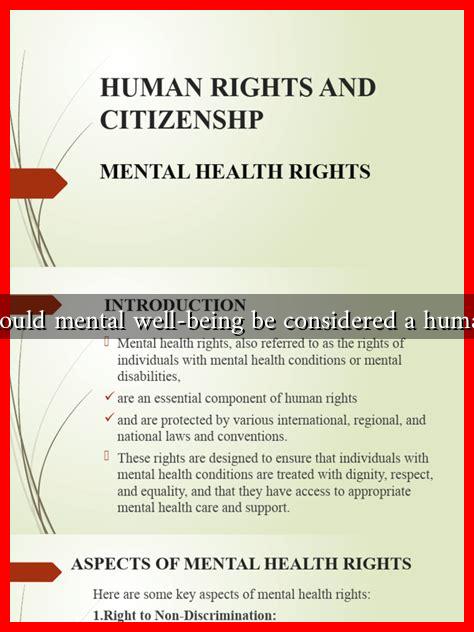-
Table of Contents
- Why Should Mental Well-Being Be Considered a Human Right?
- The Definition of Mental Well-Being
- The Global Mental Health Crisis
- Legal Frameworks Supporting Mental Health as a Human Right
- The Societal Benefits of Prioritizing Mental Well-Being
- Case Studies: Successful Implementation of Mental Health Rights
- Conclusion: A Call to Action
Why Should Mental Well-Being Be Considered a Human Right?
Mental well-being is an essential component of overall health, yet it is often overlooked in discussions about human rights. As societies evolve, the recognition of mental health as a fundamental human right is gaining traction. This article explores the reasons why mental well-being should be considered a human right, supported by research, statistics, and real-world examples.
The Definition of Mental Well-Being
Mental well-being encompasses emotional, psychological, and social aspects of health. It affects how individuals think, feel, and act, influencing their ability to cope with stress, relate to others, and make choices. The World Health Organization (WHO) defines mental health as a state of well-being in which every individual realizes their potential, can cope with the normal stresses of life, can work productively, and can contribute to their community.
The Global Mental Health Crisis
The urgency of addressing mental health as a human right is underscored by the global mental health crisis. According to the WHO, approximately 1 in 4 people will experience a mental health issue at some point in their lives. Here are some alarming statistics:
- Over 450 million people worldwide suffer from mental disorders.
- Suicide is the second leading cause of death among 15-29-year-olds globally.
- Depression is the leading cause of disability worldwide.
These figures highlight the pressing need for mental health services and support systems, which are often lacking in many parts of the world. Recognizing mental well-being as a human right can catalyze change and promote access to necessary resources.
Legal Frameworks Supporting Mental Health as a Human Right
Several international treaties and declarations support the notion that mental health is a human right. The Universal Declaration of Human Rights (UDHR) states that everyone has the right to a standard of living adequate for health and well-being. Additionally, the Convention on the Rights of Persons with Disabilities (CRPD) emphasizes the importance of mental health and the need for accessible services.
Countries like Finland and Portugal have made significant strides in integrating mental health into their healthcare systems, demonstrating that legal frameworks can effectively promote mental well-being as a human right. For instance, Finland’s mental health strategy focuses on prevention, early intervention, and community-based care, resulting in improved mental health outcomes.
The Societal Benefits of Prioritizing Mental Well-Being
Recognizing mental well-being as a human right has far-reaching societal benefits:
- Improved Productivity: Mental health issues can lead to decreased productivity in the workplace. By prioritizing mental well-being, organizations can foster a healthier workforce, leading to increased efficiency and economic growth.
- Reduced Healthcare Costs: Investing in mental health services can reduce the burden on healthcare systems. For every $1 invested in mental health treatment, there is a return of $4 in improved health and productivity.
- Enhanced Community Cohesion: Communities that prioritize mental well-being tend to be more cohesive and resilient. This can lead to lower crime rates and improved social stability.
Case Studies: Successful Implementation of Mental Health Rights
Several countries have successfully implemented policies that prioritize mental health as a human right:
- New Zealand: The country has integrated mental health services into primary care, ensuring that individuals have access to mental health support without stigma.
- Australia: The National Mental Health Strategy emphasizes the importance of community-based care and has led to significant improvements in mental health outcomes.
These examples illustrate that when mental well-being is treated as a human right, it can lead to transformative changes in society.
Conclusion: A Call to Action
In conclusion, mental well-being is an integral part of human health and should be recognized as a fundamental human right. The global mental health crisis, supported by legal frameworks and successful case studies, underscores the need for immediate action. By prioritizing mental health, societies can reap the benefits of improved productivity, reduced healthcare costs, and enhanced community cohesion. It is time for governments, organizations, and individuals to advocate for mental well-being as a human right, ensuring that everyone has the opportunity to lead a fulfilling and healthy life.
For more information on mental health rights, visit the World Health Organization.

